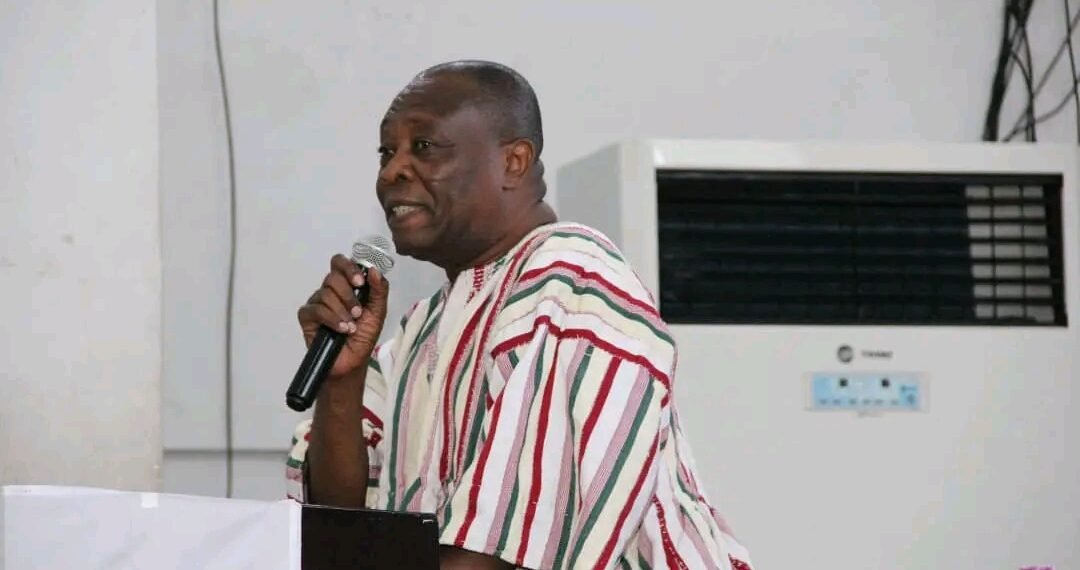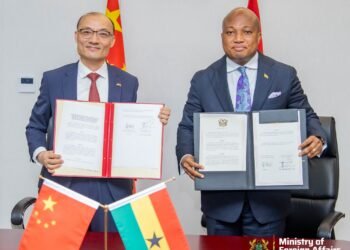The National Education Forum has concluded with a strong call for urgent and strategic reforms in Ghana’s education system.
The event, held at the University of Professional Studies, Accra (UPSA), saw Professor George K. T. Oduro, Chair of the Planning Committee, present a comprehensive communique outlining the forum’s findings and recommendations.
The Vice President, Professor Naana Jane Opoku-Agyemang, graced the closing ceremony as the Special Guest of Honour.
“The committee engaged stakeholders across the country and received over 2,000 proposals from individuals and organizations, including a survey on free SHS with over 20,000 respondents, do hereby submit this communique to the government of Ghana as a broad representation of our deliberations, after which a detailed report shall be submitted to his excellency, the President of the Republic.”
Professor George K. T. Oduro, Chair of the Planning Committee of the National Education Forum
The communique identified several pressing challenges and offered concrete recommendations for policy action, including an urgent commitment to address the basic education infrastructure deficit.
According to the committee, a significant gap exists in access to quality basic education, particularly in underserved communities.
Challenges such as inadequate digital infrastructure, school furniture, electricity supply, and STEM facilities hinder educational progress.
The communique stressed that the government must prioritize investments in basic education infrastructure, leveraging innovative financing models to bridge the rural-urban divide.

The communique also noted that the quality of education in rural areas significantly lags behind urban centers due to inadequate teaching and learning resources, poor teacher deployment, and weak school management.
“The government must be deliberate in investing to bridge the gap between the quality of basic education in rural areas versus urban areas by ensuring equality through the equitable distribution of education resources across the country.
“Efforts must be made to strengthen school management and supervision through the adoption of a national leadership standard and improving teacher development deployment to rural areas through a decentralized teacher deployment system.”
Professor George K. T. Oduro, Chair of the Planning Committee of the National Education Forum
Acknowledging the declining financing for basic education, the forum noted that the introduction of Free SHS has inadvertently led to a decline in funding for basic education.
Furthermore, delays in fund disbursement have disrupted school operations. The communique called for an equitable framework for education financing, with priority given to infrastructure development, foundational learning, and digital learning facilities.
Teacher Welfare and Motivation
On the above, the forum noted that stakeholders highlighted the need for better incentives, particularly for teachers in deprived areas.
Recommendations included improved accommodation, allowances, salary enhancements, and scholarship opportunities for teachers.
Recognizing the significance of key stakeholders, the forum noted that Parent-Teacher Associations (PTAs), faith-based organizations, and alumni associations play crucial roles in education.

The forum urged the government to institutionalize their contributions through a formalized framework that enhances their participation and impact.
On phasing out the Double-Track System, the forum noted that the double-track system has been described as burdensome for teachers, students, and parents.
The forum, thus, recommended urgent expansion of school infrastructure to facilitate its abolition. Additionally, the forum suggested that private secondary schools should be integrated into the system to ease enrollment pressure.
Improvement of Food Quality in Secondary Schools
The poor quality and insufficient quantity of meals provided under the Free SHS program were raised as major concerns.
The forum charged the government to take decisive steps to improve the nutrition and quantity of food served in schools.
Addressing indiscipline and exam malpractices, the forum bemoned the growing levels of indiscipline and examination malpractices in secondary schools require immediate action.
The forum called on the government to collaborate with stakeholders to enforce strict disciplinary measures and uphold academic integrity.
Additionally, the Technical and Vocational Education and Training (TVET) sector faces significant challenges, including poor infrastructure, inadequate funding, and a shortage of qualified instructors.

The government must increase investments in TVET and collaborate with industry players to enhance workplace experience learning.
Increasing secondary school participation in TVET, the communique noted that low enrollment of secondary school students in TVET programs remains a concern.
The forum suggested improving the image of TVET through strategic partnerships with industry and the integration of digital learning models.
On promoting inclusive education, the lack of inclusive education infrastructure was highlighted. According to the communique, the government must ensure full implementation of the Inclusive Education Policy, ensuring that no learner is left behind.
Stressing the need to address tertiary education infrastructure deficits, the communique emphasized the need for more investment in tertiary education infrastructure, particularly hostel facilities. Public-private partnerships were suggested as a viable financing option.
Highlighting the need to establish a National Research Fund, the forum indicated that that there is no dedicated fund for research in Ghana, and the absence of a coordinating framework hinders innovation. It charged the government to establish and operationalize a National Research Fund to support academic and scientific research.

Ensuring academic freedom: the excessive interference of government in the administration of educational institutions was flagged as a major issue. The forum urged the government to guarantee academic freedom within a defined regulatory framework.
Curriculum enhancement for national development: According to the communique, Ghana’s education curriculum requires urgent review to align with national development goals.
The government must undertake a comprehensive curriculum review, prioritize resource allocation for its implementation, and improve assessment systems.
Government’s Response: A Commitment to Reform
Hon. Haruna Iddrisu, Minister of Education, responded to the communique, affirming the government’s commitment to implementing the recommendations.
In his address, Hon. Iddrisu reassured stakeholders that the government, under President John Dramani Mahama, will not interfere with the academic freedom of tertiary institutions.
“The essence of this forum, the National Education Forum, and the ideas, recommendations, or blueprints that will emanate from it will help Ghana secure a sustainable future. So be assured that is our greatest desire.”
Hon. Haruna Iddrisu, Minister of Education
He also announced plans to operationalize the National Research Fund, with an initial seed fund allocated through the Ghana Education Trust Fund (GETFund).
Additionally, he disclosed that 2% of GETFund allocations would be directed toward technical and vocational education.
The minister also revealed that a new local scholarship initiative would be launched, allowing public universities to support five Ph.D. students annually. These measures, he noted, were part of the broader strategy to strengthen Ghana’s education system and equip students with 21st-century competencies.

Hon. Iddrisu concluded by affirming that the government looks forward to receiving the forum’s final report, which will provide a roadmap for policy implementation.
The National Education Forum has set the stage for transformative change in Ghana’s education sector. The communique, backed by extensive stakeholder engagement and empirical research, provides a solid foundation for policy interventions.
With a firm commitment from the government, stakeholders anticipate meaningful reforms that will address the critical challenges facing Ghana’s education system and ensure sustainable development.
READ ALSO: OPEC+ Boosts Refined Fuel Exports, Weakening Crude Cuts




















